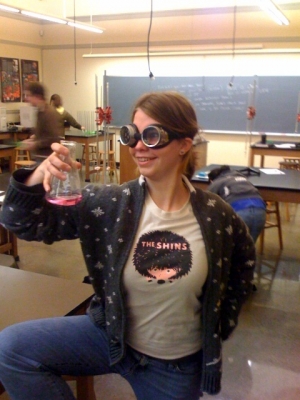Get up, Take a shower, Eat Breakfast, Go to work by Morse Kode
December 16th, 2008 3:30 PMI'm quite the baker, so I've handled many an egg but no amount of practiced has helped me with cracking them. No matter the force or angle I use I always end up with pesky little fragments that get in the batter and have to be removed by hand. So I developed a new way to crack open an egg, which should result in minimal damage to the shell while still severing it.
Now we've all heard of the temperature being so hot that you can fry an egg on the sidewalk, but what about it being so cold that you could crack an egg shell?

SCIENCE!: Theoretically this should work. The inside of an egg is made up entirely of liquid-like and globular substances. When frozen the yolk and white of the egg should expand, increasing the pressure inside of the egg until it is too great for the shell to handle thus causing it to crack. Once the shell has been damaged, it should be fairly easy to remove the shell, allow the egg to thaw, and use it for whatever culinary purposes you may desire.
Seeing as how the temperature in Portland hasn't been above 25 degrees Fahrenheit for the past two days, I figured that my front yard would be the perfect environment for the experiment.
I began with two eggs which I covered in snow.


I then waited. 24 hours later I returned to my undisturbed eggs.

My attempt at cracking by freezing was a great success.



I then went to freeing the eggs. I first tried to get the shell off the egg while it was still frozen. It ended up being far more difficult than cracking eggs normally as I had to pull chips of the shell off the egg-cube, but it ended up looking pretty frickin sweet.


With the second egg I decided to heat the egg a little, so as to return the yolk and white to it's natural state and then open it. Another smashing success.


With my eggsperiment a success, I decided to use the specimens to make victory brownies.

it just goes to show you that you can't go wrong with baking, snow, and a little science.
25 vote(s)

rongo rongo
1
I. Riot
2
Burn Unit
3
saille is planting praxis
5
zer0gee
2
Meelar
4
Josh
5
Scarlett
5
done
5
Evil Sugar
5
LittleMonk
4
Hemingway Kat
2
Mister Opinion
5
Crazy Child
2
Loki
3
Eidhnean entwines
2
artmouse
4
Leslie
5
sami
5
Sean Mahan
4
Sass Afrass
4
Marie the Alliaphage
5
Waldo Cheerio
5
Mr. Tod
5
Pixie
Favorite of:
Terms
votelater, egg, freeze, ice, cooking, science9 comment(s)
I imagine that you'd need to thoroughly cook whatever included the eggs to counteract any separation issues... thawing and eggs seems like a risky scenario.
Provided you only thawed what you immediately used though, this is actually a pretty good idea for people who bake only occasionally(like me) who rarely have fresh eggs to spare. Portioning it out, maybe even using an ice-cube tray of beaten eggs would be pretty great though. I'll try it.
Freezing Eggs Eggs can be stored frozen for several months in airtight containers. Remove them from the shell, which would shatter as its contents expanded during freezing. Allow some room for expansion in the containers, and press plastic wrap onto the surface to prevent freezer burn (see p. 146) before covering with a lid. Whites freeze fairly well; they lose only a modest amount of their foaming power. Yolks and blended whole eggs, however, require special treatment. Frozen as is, they thaw to a pasty consistency and can no longer be readily combined with other ingredients. Thoroughly mixing the yolks with either salt, sugar, or acid will prevent the yolk proteins from aggregating, and leaves the thawed mixture fluid enough to mix. Yolks require 1t salt, 1T sugar, or 4T lemon juice per pint (respectively 5g, 15g, or 60ml per half liter), and whole eggs half these amounts. The equivalent of U.S. Large egg is 3T whole egg, or 2T white and 1T yolk.
You are like the Julia Child of Science!
Your frozen egg looks like ...

the Haikureallifesecretegg!

Very nice.
And Hoooray for playing for team cøøking!
After I saw this praxis I knew that she needed to be a member.
As an avid baker, I approve! Also, I may try this out next time I make a cake or whatnot...
The eggs look awesome when they are de-shelled, but really I had to vote for the pun. Eggsperiment? I am torn between groaning and laughing!
I had this happen quite accidentally when the back of the fridge was getting a little too cold. Ended up sort of pealing/chipping away at the shell with a potato peeler. Once freed from the shell, I had the same impression"oh that's pretty cool" Don't think I would want to do it on purpose though (unless for praxis of course)
_ _... ..._ _
_.. .
_._ _. ...._ _ _. .
_._



































That's great! I've never considered freezing an egg to crack it open. Especially sweet that it actually worked.